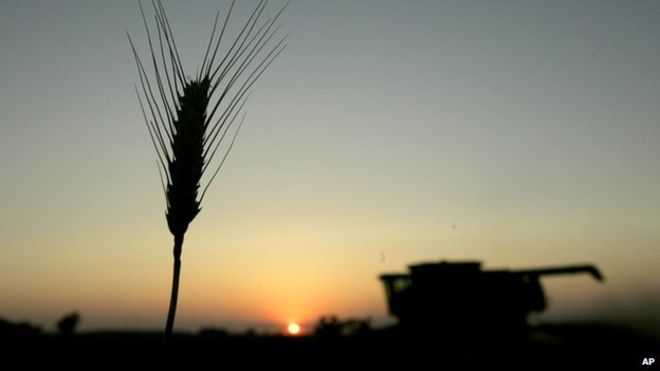The call has been made by the Global Open Data for Agriculture and Nutrition (Godan) initiative, which includes the UK and US governments.
The group hopes a million people will sign its online petition calling on organisations to open their data.
They plan to present the petition during a meeting at the UN in New York.
The Godan initiative has more than 330 partners around the globe, including the UK, US and Kenyan governments.
It was established in 2013 to encourage and promote open-data policies regarding agriculture and nutrition information held by governments, business and NGOs.
`Available and accessible`
On Thursday, it will host a two-day summit, which it describes as the "largest event of its kind", with the goal of bringing together politicians, government officials, researchers and business leaders to raise awareness of their call for all agriculture and nutrition to be universally "available, accessible and useable".
On Friday, Godan plans to convene a high-level forum, which organisers hope will see the UN endorse its call for action and adopt Godan`s petition.
Godan spokeswoman Natasha Mudhar said: "Open data is to innovation in agriculture and nutrition, and hence promoting food security, by improving farming methods, enhancing food production and providing better information and advice."
Jaime Adams, senior adviser to the US Department of Agriculture`s chief scientist, is responsible for managing the US Government`s involvement in the global open data initiative.
She told BBC News: "We currently have seven billion people on the planet, and that is forecast to reach nine billion people by 2050. Today, 800 million people struggle with hunger and malnutrition. Yet, at the same time, experts tell us that we produce more than enough food in the world to feed the current population.
"For me personally, it is really heartbreaking to think that people around the world go to bed hungry every night when we have enough food in the world to feed everyone."
`Heartbreaking`
Ms Adams said that while there were a vast array of projects looking to deliver solutions at a micro level, decisions were having to be made with incomplete information.
"We are fragmented and we do not have a global, comprehensive picture," she observed.
"We don`t know what is produced and where, what happens to it after it has been harvested, what food products come from those harvests etc. We do not have a complete and comprehensive picture as we do in other industries."
She contrasted the current situation regarding data concerning food security with the global availability of meteorological data.
"In recent years, on your smartphone, you can have an application that allows you to look at the weather forecast in any part of the world," Ms Adams said.
"With a degree of accuracy, you can know what the weather is going to be like before you travel and can plan accordingly.
"We don`t have something like that for agriculture and nutrition. For example, if I was travelling to Africa, and was going a couple of hours outside of a major city, I do not know if I am going to have access to food, or fresh fruit and vegetables."
She said that many governments around the world considered its data on agricultural production, consumption or storage as sensitive data and was reluctant to share the information.
Ms Adams added: "In the private sector, there is proprietary data but eventually, when that data no longer has value, there is a lot of data that supports research projects but it would take the initiative of the private company in order to invest resources in order to make that data open."
She hoped the Godan summit and the high-level forum at the United Nations would help raise the issue and encourage heads of governments to adopt open-data policies.
But Ms Adams explained: "There are a lot of countries around the world that still have a long way to go."
More about:
















































